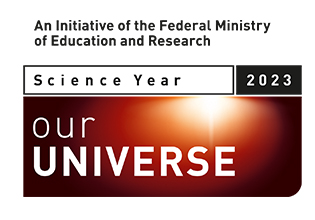Policy Advice
Science Years

The Science Years, which were launched in 2000 by the German Federal Ministry of Education and Research and the German science initiative "Science in Dialogue“, promote dialogue between researchers and the public, and give people an understanding of current scientific developments. Each Science Year focuses on a different topic. The German National Academy of Sciences Leopoldina stages several events during each Science Year.
Wissenschaftsjahr 2024 – Freiheit
Die Relevanz des Themas Freiheit unterstreichen zwei Jahrestage: 75 Jahre Grundgesetz und 35 Jahre Mauerfall. Zwei Ereignisse der deutschen Geschichte, die zeigen: Freiheit ist nicht selbstverständlich. Daran möchte das Wissenschaftsjahr 2024 anknüpfen: Ziel des Jahres ist es, die Öffentlichkeit dazu anzuregen, über den Wert der Freiheit, ihre Bedeutung und den Begriffan sich ins Gespräch zu kommen. Mehr
Science Year 2023 – Our Universe
The Science Year 2023 sheds light on the big questions surrounding our universe and connects age-old queries of humanity about existence and meaning with current research projects and future perspectives: "Are we alone in the cosmos?", "What makes our Earth a habitable planet?", "What are black holes?" and "What does the future of our planet look like, and how can we protect our habitat?" More (German only)
Science Year 2022 – Participate!
Whether it is the increasing importance of algorithms in everyday life and work, the question of how and by what a growing world population will feed itself, or the influence of our lifestyle on the global climate: as a society we are facing great challenges. In order to overcome them collaboratively, it is crucial that we all engage with the findings of science and research, ask questions and contribute our own perspectives and knowledge.
Science Year 2020 – Bioeconomy
Human beings have always used natural resources such as plants, animals or microorganisms to produce food, clothing, heat or light. Today, in light of the growing world population, dwindling biodiversity, advancing climate changes and shifting consumer needs, we are particularly challenged to use these resources efficiently and sustainably. This is where bioeconomy comes into play, intending to generate and use biological resources and biological knowledge to meet our demands for raw materials, products, and services.
Science Year 2019 – Artificial Intelligence
Computers defeat humans in a game of chess, analyze complex data in a matter of seconds and even help with the diagnosis of diseases: Artificial intelligence (AI) makes all this possible. It holds the potential to support people and improve many areas of our lives. At the same time, every artificial intelligence needs limits. After all, it must serve humankind and follow legal and ethical guidelines. To ensure success, it is important to discuss the opportunities and risks of AI early on.
Science Year 2018 – Working Life of the Future
Technical progress is changing the way we work. Digitalization is altering job profiles and work places, new work-time models influence our coexistence. Artificial intelligence increasingly shapes the daily work routine and brings new opportunities as well as challenges for society. What will work be like in the future? How does a society prepare for a changing working life? What is the role of science in the design of new work environments?
Science Year 2016*17 – Seas and Oceans
Seas and oceans cover two-thirds of the earth´s surface. They form a system about which only very little is known. This means that practically every expedition leads to new findings. The use of maritime resources and the influence of people on the seas and their ecosystems is the focus of the “Science Year 2016*17 - Seas and Oceans”.
Science Year 2015 – City of the Future
Cities are the most popular place to live for most people today. The number of urban dwellers is increasing daily. Life in the city is attractive, not least thanks to the results of science and research. Scientific findings will become even more important for people in cities to lead autonomous lives in future. The internationally renowned urban planner Jaime Lerner once said that cities are the solution, not the problem. This was the rationale of 'Science Year 2015 – City of the Future'.
Science Year 2014 - The Digital Society
Digital technologies play an important role in our lives whether in everyday household devices, in communication, in science or in industry. Science Year 2014 was dedicated to the topic “The Digital Society”. The rapid developments taking place in this sector were the focus of national attention in 2014. What opportunities do they present? What questions are raised?
Science Year 2013 – Demographic Change
The Science Year 2013 was dedicated to Demographic Change. Core aspects of change in society – “We are growing older. There are fewer of us. We will be more diverse” – were discussed in a number of events such as the Bürgerkonferenzen all over Germany. In recent years, the joint academy groups “Aging in Germany” and “Future with Children” have already drawn up statements and recommendations on these topics.
Science Year 2012 – “Project Earth: Our Future”
The motto in 2012 was “Project Earth: Our Future”. The year was dedicated to sustainability research. It is essential for scientists from a very wide range of disciplines to cooperate in order to thoroughly understand the concept of sustainability in terms of a duty to safeguard ecological equilibrium, economic security and social justice. The Science Year 2012 created a superb forum for dialogue on these questions. The German National Academy of Sciences Leopoldina took advantage of the opportunity provided by the Science Year to hold public discussion events.
Year of Science 2011 – Research for Our Health
The Year of Science 2011 – Research for Our Health – focuses on the human being and launches an interdisciplinary dialogue in society about the objectives, challenges and fields of modern health research. Core objectives were, among others, Widespread diseases and demographic change, Differentiated medicine or Prevention and nutrition. The Leopoldina offered public events in this context such as a fishbowl discussion on preimplantation genetic diagnostics.

